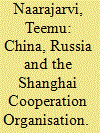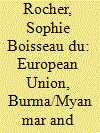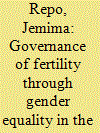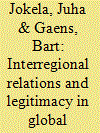|
|
|
Sort Order |
|
|
|
Items / Page
|
|
|
|
|
|
|
| Srl | Item |
| 1 |
ID:
112865


|
|
|
|
|
| Publication |
2012.
|
| Summary/Abstract |
The meaning of Asia has changed drastically during the millennia the concept has been in use. Its usage was established in Greek literature 2,500 years ago as a geographic reference to lands inhabited by the Greeks at the Eastern side of the Aegean Sea. Over the ensuing centuries, Asia's Western boundary was extended to the rivers Don in the North and Nile in the South. At that time, it hardly contained any definite political or civilisational meanings. These were added to the concept in 1730 in a kind of Swedish-Russian cooperation when the Urals were redefined to form the boundary between Europe and Asia, the former starting to represent progress, and the latter its opposite. This situation has been gradually changing after World War II, when first definitions made in the United States, and later in East Asian countries have devalued the position of Europe and elevated that of Asia. Today, Asia is not a geographical concept. It is a political commonplace, used as a strong and positively loaded linguistic asset in political rhetoric in the Asian Pacific area for various kinds of regional integrative purposes.
|
|
|
|
|
|
|
|
|
|
|
|
|
|
|
|
| 2 |
ID:
112866


|
|
|
|
|
| Publication |
2012.
|
| Summary/Abstract |
This paper discusses China and Russia and the Shanghai Cooperation Organisation Organisation (SCO), a Eurasian regional organisation established in 2001 and consisting of China, Russia and the four Central Asian republics of Kazakhstan, Kyrgyzstan, Tajikistan and Uzbekistan. I argue that while the two largest members of the SCO are essential to the organisation, they at the same time prevent the SCO from becoming a more comprehensive regional organisation. Moreover, the actions and presence of China and Russia in Central Asia, together with inherently inauspicious characteristics of the region when compared to the post-Cold War new regionalist thinking, hinder the overall regionalisation in the area. However, regionalisation, hopefully in time leading to greater regional cooperation in Central Asia, is very much in the interests of Europe and the European Union (EU) as a potential peaceful way forward in the development of the region.
|
|
|
|
|
|
|
|
|
|
|
|
|
|
|
|
| 3 |
ID:
112867


|
|
|
|
|
| Publication |
2012.
|
| Summary/Abstract |
Structural change brought about by the end of the Cold War and accelerated globalisation have transformed the global environment. A global governance complex is emerging, characterised by an ever-greater functional and regulatory role for multilateral organisations such as the United Nations (UN) and its associated agencies. The evolving global governance framework has created opportunities for regional organisations to participate as actors within the UN (and other multilateral institutions). This article compares the European Union (EU) and Association of Southeast Asian Nations (ASEAN) as actors within the UN network. It begins by extrapolating framework conditions for the emergence of EU and ASEAN actorness from the literature. The core argument of this article is that EU and ASEAN actorness is evolving in two succinct stages: Changes in the global environment create opportunities for the participation of regional organisations in global governance institutions, exposing representation and cohesion problems at the regional level. In response, ASEAN and the EU have initiated processes of institutional adaptation.
|
|
|
|
|
|
|
|
|
|
|
|
|
|
|
|
| 4 |
ID:
112870


|
|
|
|
|
| Publication |
2012.
|
| Summary/Abstract |
The European Union's (EU) normative roles in global politics have in recent years been a hotly debated topic. The EU promotes its political values outside of the Union, especially with regard to prospective accession countries and small developing countries. However, a normative foreign policy approach encounters considerable challenges when confronted with major powers, such as China and Russia that do not share the political values promoted by the EU. Attempts at pursuing a normative policy towards these countries often come across as halfhearted. This article discusses EU normative policy towards China. It identifies loss of the moral high ground, conflicting positions of EU members and lack of leverage as the three main factors hampering it. It needs to be recognised that these problems are fundamental and stem from the very nature of the EU itself. The article argues that instead of a halfhearted offensive normative approach towards China or ubiquitous dialogues with partners, the EU may be better off with a more determined policy of defensive normativity. This would entail being more insistent in upholding European values within our own community rather than seeking to export them outside of the Union, and favouring demand-driven cooperation. The choice stands between altering the self-image of the EU to make it better correspond to reality, or making reality live up to the self-image.
|
|
|
|
|
|
|
|
|
|
|
|
|
|
|
|
| 5 |
ID:
112869


|
|
|
|
|
| Publication |
2012.
|
| Summary/Abstract |
The recent events in Burma/Myanmar, beginning with the November 2010 elections and the subsequent series of reforms, have taken Europe by surprise. For the last 20 years, the European Union (EU) has been one of the most vocal critics of the junta regime, thus jeopardising its constructive relations with the Association of Southeast Asian Nations (ASEAN) and its members. In a new context of transition, the EU has to show that it can quickly adjust to an unanticipated scenario if it does not want its credibility to remain deeply undermined in a regional space that is undergoing structural transformations. Europe and ASEAN should together find a way to consolidate both the socio-political transitions in Southeast Asia and the validity of European values.
|
|
|
|
|
|
|
|
|
|
|
|
|
|
|
|
| 6 |
ID:
112864


|
|
|
|
|
| Publication |
2012.
|
| Summary/Abstract |
The global financial crisis and the shift of economic strength to a rising Asia have ushered in European introspection and allusions to the decline of the European Union (EU). The EU's ambitions to have a normative impact in the world have been called into question. The seven articles in this guest-edited issue explore processes of change relating to geopolitical definitions, regional actorness, interregionalism, and normative power within the framework of EU-Asia relations. This introduction contextualises the themes taken up in the different articles. It considers important divides in the recent history of Europe-Asia relations and outlines key transformations in the global environment, before critically reflecting on the significance of normative power for Europe.
|
|
|
|
|
|
|
|
|
|
|
|
|
|
|
|
| 7 |
ID:
112871


|
|
|
|
|
| Publication |
2012.
|
| Summary/Abstract |
It is generally accepted amongst demographers that a declining fertility rate has negative economic consequences, namely in the guise of a slowdown in economic growth. Declining fertility has, therefore, been seen as a major problem in Japan and the EU for the last 20 years. Over the past two decades, demographers and social scientists have discussed intensely the causal connection between gender equality and female fertility, to the extent that during the past 10 years, gender equality has become the cornerstone of the EU and, to a degree, Japanese public policy aiming to re-optimise fertility rates. This article scrutinises the different ways in which gender equality is erected by demographic and social scientists in Japan and the EU as a technology of governance with the aim of re-exerting control over sexual reproduction. I argue that in the EU, scientists engage directly and endeavour to develop demographic theory based on European case studies, whereas Japanese gender equality policy is developed mainly by measuring the successes of European gender equality policy and considering the results it might yield in Japan. In both cases, however, gender equality is taken up as a tool for the governance of fertility.
|
|
|
|
|
|
|
|
|
|
|
|
|
|
|
|
| 8 |
ID:
112868


|
|
|
|
|
| Publication |
2012.
|
| Summary/Abstract |
This article explores the ramifications of the European Union's (EU) internal legitimacy debate for its external relations. It applies the Asia-Europe Meeting (ASEM) as a case study to examine the EU's attempts to promote legitimacy in global governance, more specifically in interregional institutions. The article's theoretical framework draws from the EU's legitimacy debate. It identifies three key sources of legitimacy, namely, (i) input legitimacy or democratic control and accountability, (ii) output legitimacy or performance and achievement of core purposes, and (iii) the degree of common identity as externalised through collective representation and the articulation of shared norms and values. The empirical analysis thereafter leads to three observations. First, the EU's presence has contributed to an increased democratic involvement by ASEM's different stakeholders including parliaments and civil society. Second, purely from an institutional legitimacy perspective ASEM achieves its purpose as a forum to 'constructively engage' with Asian countries and address issues relating to global governance. Third, ASEM reveals the EU's dual identity as an intergovernmental grouping and an organisation with a gradually increasing capacity of collective representation. However, the advancement of the EU's normative objectives through ASEM has been problematic, leading to a more interest-based and pragmatic policy path. The article concludes that the EU's legitimacy debate has had a bearing on relations with Asia and, in particular, with ASEM. Importantly, and given the EU's setbacks, some elements of the 'EU's way' have proven successful in promoting democratic notions of legitimacy beyond the state.
|
|
|
|
|
|
|
|
|
|
|
|
|
|
|
|
|
|
|
|
|